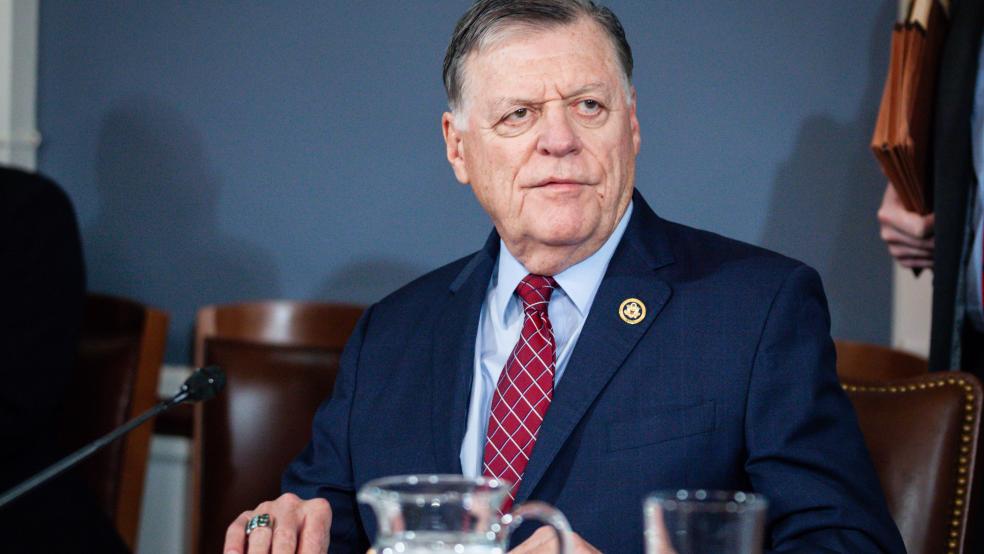As the House starts work on fiscal year 2025 spending bills, the Appropriations Committee on Thursday approved an overarching GOP plan for divvying up just over $1.6 trillion in discretionary funding. The allocations, approved by a 30-to-22 margin, were previewed last week by Republican Committee Chairman Tom Cole of Oklahoma, who said again today that the proposed funding levels adhere to the bipartisan agreement codified in last year’s Fiscal Responsibility Act — a claim Democrats dispute because the numbers don’t include the negotiated side deals.
House Republicans’ proposed allocations would increase defense spending by nearly $9 billion to more than $895 billion while cutting non-defense spending by 6%, to $710.7 billion, with some agencies in line for steeper cuts of 10% or 11%.
The subcommittees on Commerce, Justice, and Science and Financial Services and General Government would get significant increases while Labor, Health and Human Services, and Education would see a large cut, as would the State Department and Foreign Operations subcommittee.
“An honest accounting of our fiscal state shows that mandatory spending is the main driver of our budgetary crisis, not discretionary spending. But we must still do our part to be good stewards of taxpayer dollars,” Cole said at Thursday’s markup.
Democrats panned the GOP budget allocations and said the proposed topline funding levels fell short of last year’s deal and what the American people need. “While I know we will have cordial and respectful negotiations down the line, quite frankly, I am experiencing déjà vu all over again, as we begin down an already well-trodden path towards chaos, division, and shutdown threats,” said Rep. Rosa DeLauro, the top Democrat on the committee. “Democrats will accept nothing less than a 1% increase over 2024 in nondefense and defense funding. That means that the starting point for 2025 for nondefense must be at least $786 billion. Instead, the Chair’s allocations walk away from that commitment and take off the table at least $75 billion in investments for American families.”
Appropriators approve MilCon funding bill: The Appropriations Committee also approved an appropriations bill covering Military Construction, Veterans Affairs, and Related Agencies. The plan would provide more than $147 billion in discretionary funding and $231 billion for mandatory programs for a total of $378.6 billion.
“We’ve fully funded health care and benefits for our veterans and ensured the quality of life of our troops and their loved ones are prioritized,” Cole said.
But the bill also revives Republican efforts to enact controversial culture war measures limiting access to abortion, prohibiting the use of funds “to promote or advance critical race theory” and restricting diversity efforts and transgender care. Democrats blasted the legislation and said the GOP plan would worsen the quality of life for servicemembers and veterans while cutting $718 million from last year’s military construction funding.
“House Republicans could have very easily found broad, bipartisan support for this bill, but they chose not to. Instead, they failed to adequately fund military construction projects and loaded the bill with extreme, harmful policies meant to divide rather than unite our country,” DeLauro said. “With this bill, the first of fiscal year 2025, House Republicans have shown the country that they plan to follow the same misguided, chaotic, and harmful process they pursued last year, to the detriment of servicemembers, veterans, workers, and families.”
Panel advances Legislative Branch spending bill: The House Appropriations Legislative Branch Subcommittee approved a $7.1 billion funding plan that represents an increase of 5.6% over the 2024 level, including as-yet unspecified Senate-only items. The bill would provide a 10% increase for the Government Accountability Office; roughly 5% boosts for the Capitol Police and the Congressional Budget Office; and a 3.7% increase for the Library of Congress. Democrats again objected to GOP policy riders they called harmful.
The bottom line: The appropriations process is now underway more than four months before the new fiscal year begins and House Republicans are pushing ahead with plans to pass annual spending bills on an aggressive schedule. Still, Congress is highly unlikely to complete the task of funding the government for fiscal year 2025 by the end of September as many of last year’s fights are renewed. Lawmakers are setting up battles over funding levels, as the House Republican proposals are below what the Senate will want, and over controversial GOP policy riders. So they’re more than likely going to need a continuing resolution to prevent a government shutdown this fall, with a fight also on the horizon over how long the stopgap should be.





